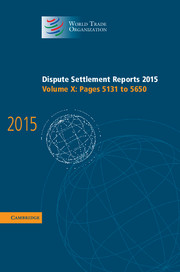Book contents
- Frontmatter
- Contents
- United States - Measures Concerning the Importation, Marketing and Sale of Tuna and Tuna Products - Recourse to Article 21.5 of the DSU by Mexico (WT/DS381): Report of the Appellate Body
- United States - Measures Concerning the Importation, Marketing and Sale of Tuna and Tuna Products - Recourse to Article 21.5 of the DSU by Mexico (WT/DS381): Report of the Panel
- Cumulative List of Published Disputes
United States - Measures Concerning the Importation, Marketing and Sale of Tuna and Tuna Products - Recourse to Article 21.5 of the DSU by Mexico (WT/DS381): Report of the Appellate Body
Published online by Cambridge University Press: 28 September 2017
- Frontmatter
- Contents
- United States - Measures Concerning the Importation, Marketing and Sale of Tuna and Tuna Products - Recourse to Article 21.5 of the DSU by Mexico (WT/DS381): Report of the Appellate Body
- United States - Measures Concerning the Importation, Marketing and Sale of Tuna and Tuna Products - Recourse to Article 21.5 of the DSU by Mexico (WT/DS381): Report of the Panel
- Cumulative List of Published Disputes
Summary
INTRODUCTION
The United States and Mexico each appeals certain issues of law and legal interpretations developed in the Panel Report, United States – Measures Concerning the Importation, Marketing and Sale of Tuna and Tuna Products – Recourse to Article 21.5 of the DSU by Mexico. The Panel was established pursuant to Article 21.5 of the Understanding on Rules and Procedures Governing the Settlement of Disputes (DSU) to consider a complaint by Mexico concerning the alleged failure of the United States to comply with the recommendations and rulings of the Dispute Settlement Body (DSB) in the original proceedings in United States – Measures Concerning the Importation, Marketing and Sale of Tuna and Tuna Products.
This dispute concerns the United States’ labelling regime for “dolphin-safe” tuna products. In the original proceedings, Mexico raised claims under the General Agreement on Tariffs and Trade 1994 (GATT 1994) and the Agreement on Technical Barriers to Trade (TBT Agreement) challenging the consistency with these Agreements of certain measures imposed by the United States on the importation, marketing, and sale of tuna and tuna products. Specifically, Mexico challenged: the Dolphin Protection Consumer Information Act of 1990, codified in United States Code, Title 16, Section 1385 (DPCIA); United States Code of Federal Regulations (CFR), Title 50, Sections 216.91 and 216.92 (original implementing regulations); and a ruling by a US Federal Appeals Court in Earth Island Institute v. Hogarth (Hogarth ruling). The original panel and the Appellate Body referred to these measures, collectively, as the “measure at issue” or the “US dolphin-safe labelling provisions”. In these compliance proceedings, we refer to them as the “original tuna measure”.
The original tuna measure specified the conditions to be fulfilled in order for tuna products sold in the United States to be labelled “dolphin-safe” or to make similar claims on their labels. The specific conditions varied depending on the fishing method by which tuna contained in the tuna product was harvested, the area of the ocean where the tuna was caught, and the type of vessel used.
- Type
- Chapter
- Information
- Dispute Settlement Reports 2015 , pp. 5133 - 5408Publisher: Cambridge University PressPrint publication year: 2017
- 2
- Cited by



